Unit 3 We should learn to take care of ourselves 课件(44张,内嵌音频)
文档属性
| 名称 | Unit 3 We should learn to take care of ourselves 课件(44张,内嵌音频) | 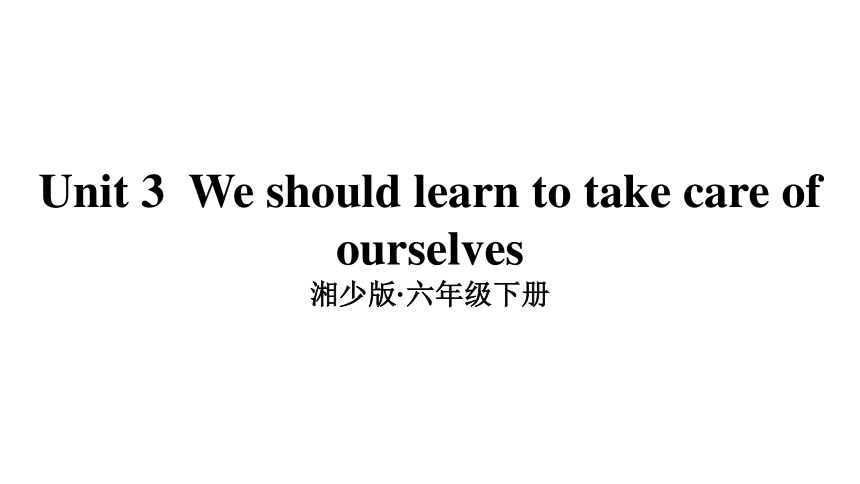 | |
| 格式 | zip | ||
| 文件大小 | 5.6MB | ||
| 资源类型 | 教案 | ||
| 版本资源 | 湘少版 | ||
| 科目 | 英语 | ||
| 更新时间 | 2020-06-02 18:12:00 | ||
图片预览

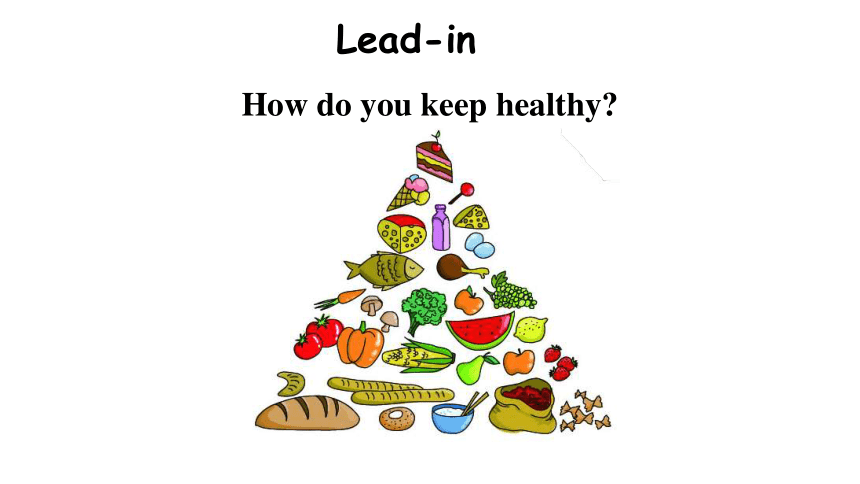

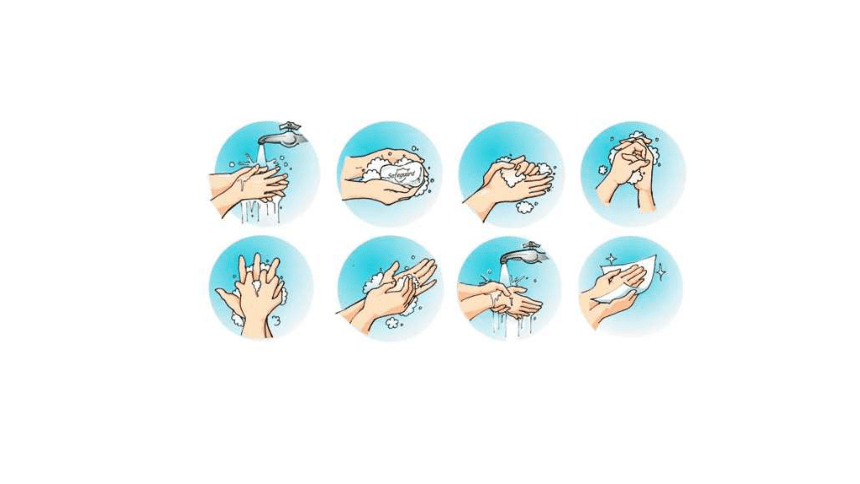

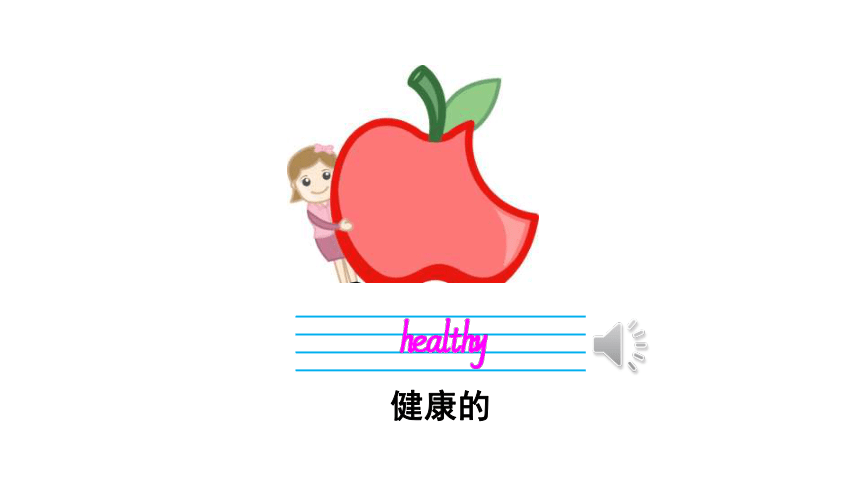
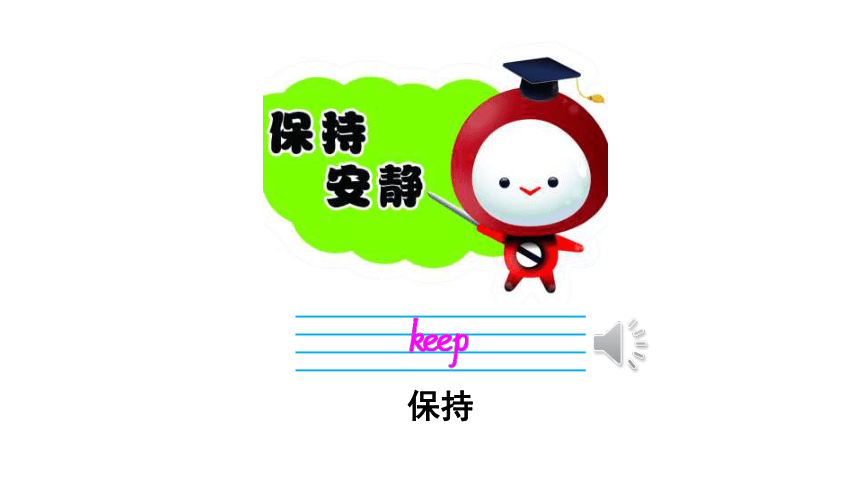
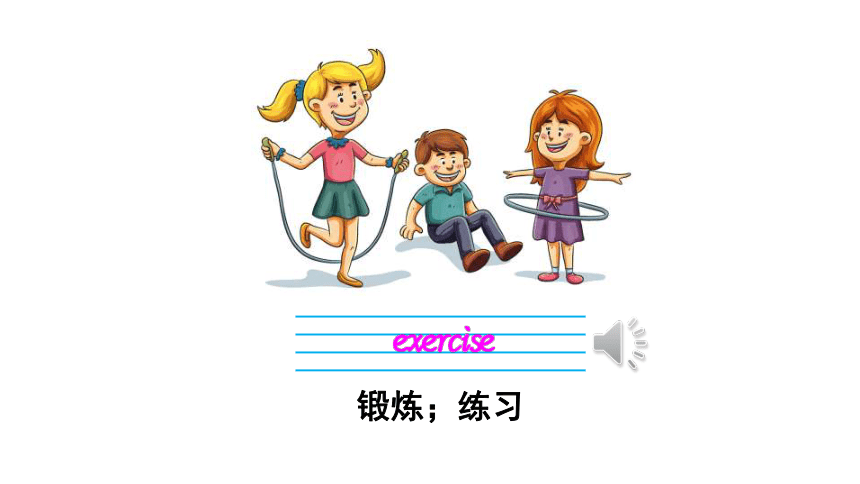


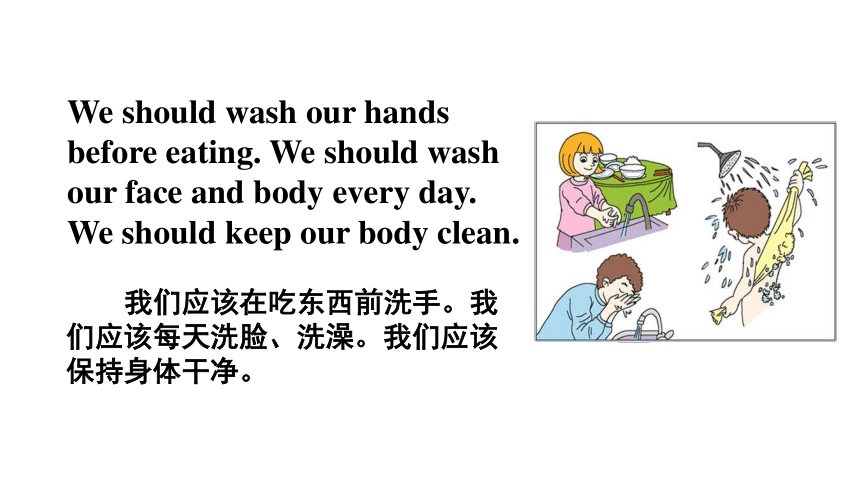
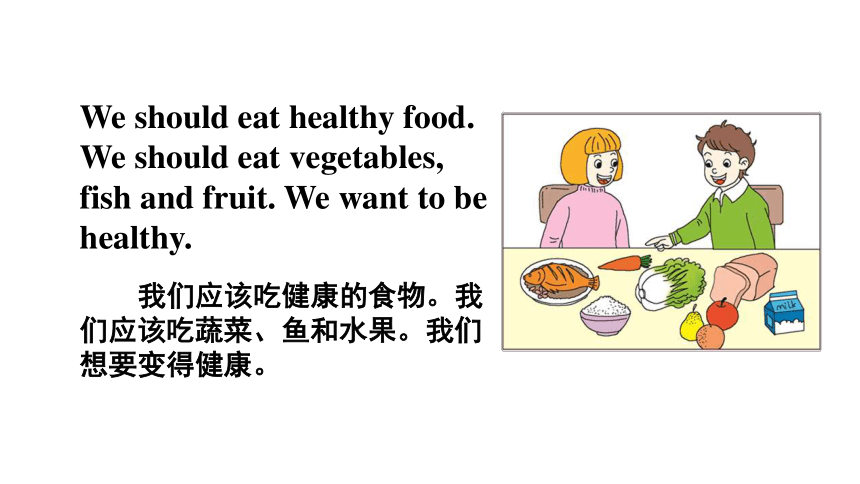
文档简介
(共44张PPT)
Unit
3
We
should
learn
to
take
care
of
ourselves
湘少版·六年级下册
Lead-in
How
do
you
keep
healthy?
New
words
照顾
健康的
保持
锻炼;练习
慢跑
Let’s
Listen
and
Say
We
should
learn
to
take
care
of
ourselves.
Then
we
can
be
strong
and
healthy.
We
should
wash
our
hands
before
eating.
We
should
wash
our
face
and
body
every
day.
We
should
keep
our
body
clean.
我们应该在吃东西前洗手。我们应该每天洗脸、洗澡。我们应该保持身体干净。
We
should
eat
healthy
food.
We
should
eat
vegetables,
fish
and
fruit.
We
want
to
be
healthy.
我们应该吃健康的食物。我们应该吃蔬菜、鱼和水果。我们想要变得健康。
We
should
do
exercise
every
day.
It’s
good
for
us.
We
can
run,
jog,
swim
and
take
long
walks.
We
want
to
be
strong.
我们应该每天运动。这对我们有好处。我们可以跑步、慢跑、游泳和长途步行。我们想要变得强壮。
We
can
sing,
dance
and
draw.
We
are
happy.
我们可以唱歌,跳舞和画画。我们很快乐。
Language
points
1.
We
should
learn
to
take
care
of
ourselves.
我们应该学会照顾自已。
learn是动词,意为“学习、知悉、了解”,后接动词不定式,即“learn
to+动词原形”结构,表示“学习做某事”。
例句:我正在学游泳。
I
am
learning
to
go
swimming.
拓展:
learn作动词,后面还可直接接名词后宾语。另外,learn
from
sb.意为“向某人学习”。
例句:我从老师那儿学了很多东西。
I
learn
a
lot
from
my
teacher.
辨析:learn与study都有“学习”的意思
①learn为“学习,学会”,侧重学习的成果,指从不知到知,从不会到会的学习,强调通过学习去获得知识和技能,它没有凭勤奋努力而获得知识的意味。
②study为“学习,研究”,强调学习的过程,指深入系统地学习,带有努力,勤奋的意味。其学习对象往往是科学,艺术和需要深入探讨,研究的问题及学科,不是单纯地获得技巧。
2.
We
want
to
be
healthy.
我们想要变得健康。
“want
to
be+形容词”意为“想要变成……”,后面常接表示职业的名词或状态的形容词。
例句:我想成为一名科学家。
I
want
to
be
a
scientist.
拓展:
“want
+to
+动词原形”表示“想要做某事”。
“want
+sb.
+to
+动词原形”表示“想要某人做某事”。
例句:我现在想回家了。
I
want
to
go
home
now.
3.
We
can
run,
jog,
swim
and
take
long
walks.
我们可以跑步、慢跑、游泳和长途步行。
can是情态动词,后接动词原形;意为“可以,
会,能”
例句:我会说英语。
I
can
speak
English.
拓展:can作情态动词,还有其他的用法:
表示请求:
例句:我可以用下你的笔吗?可以。
—Can
I
use
your
pen?
—Yes,
you
can.
表示允许:
例句:你可以做在这里。
You
can
sit
here.
表示推测(主要用于否定句和疑问句):
例句:这个故事可能是真的吗?
Can
the
story
be
true?
Let’s
Learn
keep
our
body
clean
保持我们的身体干净
eat
healthy
food
吃健康的食物
feel
happy
感到快乐
do
exercise
every
day
每天锻炼
feel
happy
感到快乐
feel是系动词,意为“感到”,其后接形容词作表语,翻译成“摸起来,感觉起来”。
例句:今天我感觉非常开心。
I
feel
very
happy
today.
拓展:除了feel以外,
look(看起来),
sound(听起来),
smell(闻起来),
taste(尝起来)都是系动词,后
面都接形容词构成系表结构。
Language
points
Let’s
Practise
We
should
keep
our
body
clean.
We
should
wash
our
hands
before
eating.
We
can
swim,
run,
jog
and
walk.
We
should
eat
healthy
food.
We
can
eat
vegetables,
fish,
meat
and
fruit.
We
should
be
happy.
Let’s
Read
Mr
Lin
is
an
80-year-old
man.
He
is
very
healthy.
He
does
exercise
every
day.
Early
in
the
morning
he
does
tai
chi
at
the
park.
Then,
he
takes
a
long
walk
around
the
park.
After
that,
he
goes
home
to
have
a
rest.
For
lunch
he
has
rice
with
vegetables,
fish
and
chicken.
In
the
afternoon,
he
usually
reads
newspapers
ad
listens
to
music.
At
night,
he
sometimes
watches
TV
for
one
or
two
hours.
He
always
goes
to
bed
before
10:00
p.m.
He’s
happy
and
healthy.
Language
points
1.
Mr
Lin
is
an
80-year-old
man.
林先生是一个80岁的老人。
80-year-old是形容词,用来修饰名词man.
当加了英文连字符“-”,则year后面不能加“s”。
例句:凯特是一个12岁的女孩。
Kate
is
a
12-year-old
girl.
注意:80-year-old当形容词,
80
years
old当名词。
2.
he
usually
reads
newspapers
ad
listen
to
music.
他通常看报纸、听音乐。
usually是频度副词,表示某事发生或做某事的频率,意思是“通常”,位于实义动词之前,系动词、助动词或情态动词之后。
例句:我通常乘公汽上学。
I
usually
go
to
the
school
by
bus.
拓展:常见的频度副词还有:
often(经常,常常),sometimes(有时候),always(总是,一直),never(从不)。
通常说来,always表示100%,usually表示80%,often表示60%,sometimes表示40%,seldom表示20%,never表示0%。
按照频率从高到低依次是:
always>usually>often>sometimes>seldom>never。
1.Answer
the
questions.
(a)How
old
is
Mr
Lin?
_________________________________
(b)What
does
Mr
Lin
do
every
morning?
___________________________________________
___________________________________________
___________________________________________
He
is
an
80-year-old
man.
In
the
morning
he
does
tai
chi
at
the
park.
Then,
he
takes
a
long
walk
around
the
park.
After
that,
he
goes
home
to
have
a
rest.
(c)What
does
he
have
for
lunch?
________________________________________
________________________________________
For
lunch
he
has
rice
with
vegetables,
fish
and
chicken.
2.What
do
you
learn
from
Mr
Lin?
Tick
√
in
the
box.
(a)
We
should
not
eat
any
meat.
(b)
We
should
do
exercise
every
day.
(c)
We
should
watch
TV
all
day.
(d)
Listening
to
music
is
good
for
us.
(e)
We
should
take
long
walks.
×
√
×
√
√
Let’s
Write
Write
down
your
answer.
1.How
old
are
you?
I’m
.
2.Where
do
you
go
for
your
exercise?
I
do
exercise
.
11
at
the
park
3.What
do
you
have
for
lunch?
I
have
.
4.What
do
you
do
to
be
happy?
I
.
rice
and
chicken
often
listen
to
music
Let’s
Have
Fun
This
is
the
way
we
brush
our
teeth,
brush
our
teeth,
brush
our
teeth.
This
is
the
way
we
wash
our
face,
wash
our
face,
wash
our
face.
This
is
the
way
we
ex-er-cise,
ex-er-cise,
ex-er-cise.
This
is
the
way
we
brush
our
teeth,
ear-ly,
in
the
mor-ning.
This
is
the
way
we
wash
our
face,
ear-ly
in
the
mor-ning.
This
is
the
way
we
ex-er-cise,
ear-ly
in
the
mor-ning.
Let’s
Know
More
Exercise
is
good
for
our
health
Liu
Wen
lives
in
Shanghai,
China.
She
goes
dancing
every
morning.
She’s
dancing
with
a
big
group
of
people
in
the
park.
They
have
fun
and
keep
fit.
刘文住在中国上海。她每天早上去跳舞。她正和一大群人在公园里跳舞。他们玩得很开心,并且保持身体健康。
Benson
lives
in
New
York,
the
USA.
He
meets
his
friends
every
afternoon.
They
play
basketball
in
the
playgroup.
They
have
fun
and
keep
fit.
本森住在美国纽约。他每天下午和他的朋友们见面。他们在操场上打篮球。他们玩得很开心,并且保持身体健康。
Mandy
lives
in
London,
the
UK.
She
goes
for
a
walk
with
her
friends.
They
usually
walk
in
the
countryside.
Sometimes
they
walk
over
the
hills.
曼迪住在英国伦敦。她和她的朋友们一起散步。
他们通常在乡下散步。有时他们爬山。
Minny
lives
in
Sydney,
Australia.
she
goes
jogging
with
her
mum.
They
jog
every
morning
near
their
home.
They
have
fun
and
keep
fit.
明尼住在澳大利亚悉尼。她和妈妈一起慢跑。
他们每天在家附近慢跑。他们玩得很开心,并且保持身体健康。
Unit
3
We
should
learn
to
take
care
of
ourselves
湘少版·六年级下册
Lead-in
How
do
you
keep
healthy?
New
words
照顾
健康的
保持
锻炼;练习
慢跑
Let’s
Listen
and
Say
We
should
learn
to
take
care
of
ourselves.
Then
we
can
be
strong
and
healthy.
We
should
wash
our
hands
before
eating.
We
should
wash
our
face
and
body
every
day.
We
should
keep
our
body
clean.
我们应该在吃东西前洗手。我们应该每天洗脸、洗澡。我们应该保持身体干净。
We
should
eat
healthy
food.
We
should
eat
vegetables,
fish
and
fruit.
We
want
to
be
healthy.
我们应该吃健康的食物。我们应该吃蔬菜、鱼和水果。我们想要变得健康。
We
should
do
exercise
every
day.
It’s
good
for
us.
We
can
run,
jog,
swim
and
take
long
walks.
We
want
to
be
strong.
我们应该每天运动。这对我们有好处。我们可以跑步、慢跑、游泳和长途步行。我们想要变得强壮。
We
can
sing,
dance
and
draw.
We
are
happy.
我们可以唱歌,跳舞和画画。我们很快乐。
Language
points
1.
We
should
learn
to
take
care
of
ourselves.
我们应该学会照顾自已。
learn是动词,意为“学习、知悉、了解”,后接动词不定式,即“learn
to+动词原形”结构,表示“学习做某事”。
例句:我正在学游泳。
I
am
learning
to
go
swimming.
拓展:
learn作动词,后面还可直接接名词后宾语。另外,learn
from
sb.意为“向某人学习”。
例句:我从老师那儿学了很多东西。
I
learn
a
lot
from
my
teacher.
辨析:learn与study都有“学习”的意思
①learn为“学习,学会”,侧重学习的成果,指从不知到知,从不会到会的学习,强调通过学习去获得知识和技能,它没有凭勤奋努力而获得知识的意味。
②study为“学习,研究”,强调学习的过程,指深入系统地学习,带有努力,勤奋的意味。其学习对象往往是科学,艺术和需要深入探讨,研究的问题及学科,不是单纯地获得技巧。
2.
We
want
to
be
healthy.
我们想要变得健康。
“want
to
be+形容词”意为“想要变成……”,后面常接表示职业的名词或状态的形容词。
例句:我想成为一名科学家。
I
want
to
be
a
scientist.
拓展:
“want
+to
+动词原形”表示“想要做某事”。
“want
+sb.
+to
+动词原形”表示“想要某人做某事”。
例句:我现在想回家了。
I
want
to
go
home
now.
3.
We
can
run,
jog,
swim
and
take
long
walks.
我们可以跑步、慢跑、游泳和长途步行。
can是情态动词,后接动词原形;意为“可以,
会,能”
例句:我会说英语。
I
can
speak
English.
拓展:can作情态动词,还有其他的用法:
表示请求:
例句:我可以用下你的笔吗?可以。
—Can
I
use
your
pen?
—Yes,
you
can.
表示允许:
例句:你可以做在这里。
You
can
sit
here.
表示推测(主要用于否定句和疑问句):
例句:这个故事可能是真的吗?
Can
the
story
be
true?
Let’s
Learn
keep
our
body
clean
保持我们的身体干净
eat
healthy
food
吃健康的食物
feel
happy
感到快乐
do
exercise
every
day
每天锻炼
feel
happy
感到快乐
feel是系动词,意为“感到”,其后接形容词作表语,翻译成“摸起来,感觉起来”。
例句:今天我感觉非常开心。
I
feel
very
happy
today.
拓展:除了feel以外,
look(看起来),
sound(听起来),
smell(闻起来),
taste(尝起来)都是系动词,后
面都接形容词构成系表结构。
Language
points
Let’s
Practise
We
should
keep
our
body
clean.
We
should
wash
our
hands
before
eating.
We
can
swim,
run,
jog
and
walk.
We
should
eat
healthy
food.
We
can
eat
vegetables,
fish,
meat
and
fruit.
We
should
be
happy.
Let’s
Read
Mr
Lin
is
an
80-year-old
man.
He
is
very
healthy.
He
does
exercise
every
day.
Early
in
the
morning
he
does
tai
chi
at
the
park.
Then,
he
takes
a
long
walk
around
the
park.
After
that,
he
goes
home
to
have
a
rest.
For
lunch
he
has
rice
with
vegetables,
fish
and
chicken.
In
the
afternoon,
he
usually
reads
newspapers
ad
listens
to
music.
At
night,
he
sometimes
watches
TV
for
one
or
two
hours.
He
always
goes
to
bed
before
10:00
p.m.
He’s
happy
and
healthy.
Language
points
1.
Mr
Lin
is
an
80-year-old
man.
林先生是一个80岁的老人。
80-year-old是形容词,用来修饰名词man.
当加了英文连字符“-”,则year后面不能加“s”。
例句:凯特是一个12岁的女孩。
Kate
is
a
12-year-old
girl.
注意:80-year-old当形容词,
80
years
old当名词。
2.
he
usually
reads
newspapers
ad
listen
to
music.
他通常看报纸、听音乐。
usually是频度副词,表示某事发生或做某事的频率,意思是“通常”,位于实义动词之前,系动词、助动词或情态动词之后。
例句:我通常乘公汽上学。
I
usually
go
to
the
school
by
bus.
拓展:常见的频度副词还有:
often(经常,常常),sometimes(有时候),always(总是,一直),never(从不)。
通常说来,always表示100%,usually表示80%,often表示60%,sometimes表示40%,seldom表示20%,never表示0%。
按照频率从高到低依次是:
always>usually>often>sometimes>seldom>never。
1.Answer
the
questions.
(a)How
old
is
Mr
Lin?
_________________________________
(b)What
does
Mr
Lin
do
every
morning?
___________________________________________
___________________________________________
___________________________________________
He
is
an
80-year-old
man.
In
the
morning
he
does
tai
chi
at
the
park.
Then,
he
takes
a
long
walk
around
the
park.
After
that,
he
goes
home
to
have
a
rest.
(c)What
does
he
have
for
lunch?
________________________________________
________________________________________
For
lunch
he
has
rice
with
vegetables,
fish
and
chicken.
2.What
do
you
learn
from
Mr
Lin?
Tick
√
in
the
box.
(a)
We
should
not
eat
any
meat.
(b)
We
should
do
exercise
every
day.
(c)
We
should
watch
TV
all
day.
(d)
Listening
to
music
is
good
for
us.
(e)
We
should
take
long
walks.
×
√
×
√
√
Let’s
Write
Write
down
your
answer.
1.How
old
are
you?
I’m
.
2.Where
do
you
go
for
your
exercise?
I
do
exercise
.
11
at
the
park
3.What
do
you
have
for
lunch?
I
have
.
4.What
do
you
do
to
be
happy?
I
.
rice
and
chicken
often
listen
to
music
Let’s
Have
Fun
This
is
the
way
we
brush
our
teeth,
brush
our
teeth,
brush
our
teeth.
This
is
the
way
we
wash
our
face,
wash
our
face,
wash
our
face.
This
is
the
way
we
ex-er-cise,
ex-er-cise,
ex-er-cise.
This
is
the
way
we
brush
our
teeth,
ear-ly,
in
the
mor-ning.
This
is
the
way
we
wash
our
face,
ear-ly
in
the
mor-ning.
This
is
the
way
we
ex-er-cise,
ear-ly
in
the
mor-ning.
Let’s
Know
More
Exercise
is
good
for
our
health
Liu
Wen
lives
in
Shanghai,
China.
She
goes
dancing
every
morning.
She’s
dancing
with
a
big
group
of
people
in
the
park.
They
have
fun
and
keep
fit.
刘文住在中国上海。她每天早上去跳舞。她正和一大群人在公园里跳舞。他们玩得很开心,并且保持身体健康。
Benson
lives
in
New
York,
the
USA.
He
meets
his
friends
every
afternoon.
They
play
basketball
in
the
playgroup.
They
have
fun
and
keep
fit.
本森住在美国纽约。他每天下午和他的朋友们见面。他们在操场上打篮球。他们玩得很开心,并且保持身体健康。
Mandy
lives
in
London,
the
UK.
She
goes
for
a
walk
with
her
friends.
They
usually
walk
in
the
countryside.
Sometimes
they
walk
over
the
hills.
曼迪住在英国伦敦。她和她的朋友们一起散步。
他们通常在乡下散步。有时他们爬山。
Minny
lives
in
Sydney,
Australia.
she
goes
jogging
with
her
mum.
They
jog
every
morning
near
their
home.
They
have
fun
and
keep
fit.
明尼住在澳大利亚悉尼。她和妈妈一起慢跑。
他们每天在家附近慢跑。他们玩得很开心,并且保持身体健康。
同课章节目录
- Unit 1 A family outing
- Unit 2 Some stories are more interesting
- Unit 3 We should learn to take care of ourselves
- Let's Know More
- Assessment Ⅰ
- Unit 4 Planting trees is good for us
- Unit 5 Our earth looks like this in space.
- Unit 6 Anne wanted to dance
- Let's Know More
- Assessment Ⅱ
- Unit 7 I'm not afraid!
- Unit 8 International Children's Day
- Unit 9 Look at these beautiful places in the world
- Let's Know More
- Assessment Ⅲ
